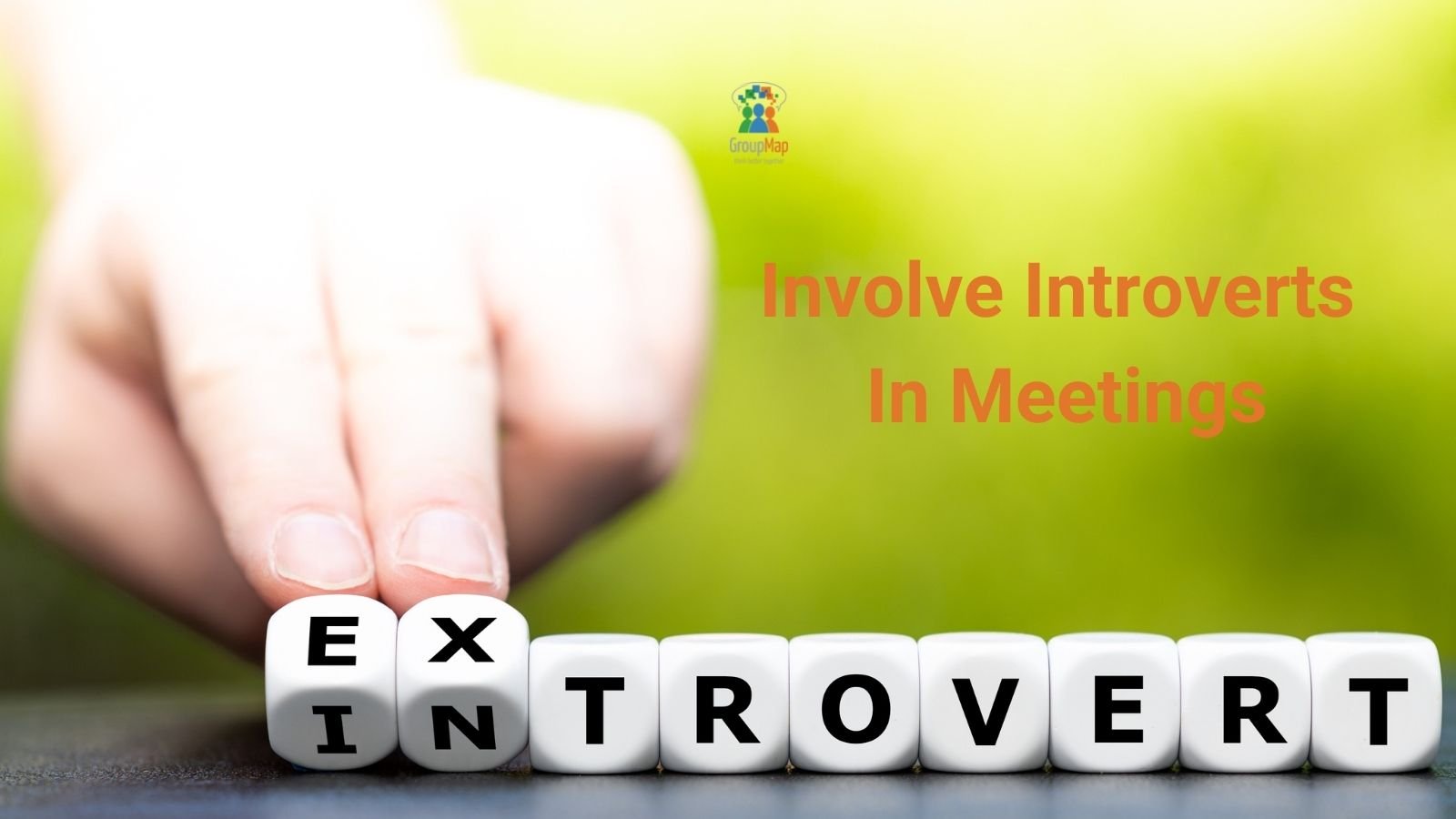Good facilitators use a variety of techniques to build inclusive meetings. One approach is to consider the different personalities in the room and then design meetings around people’s preferred working styles.
Ever since Carl Jung first defined the terms ‘introvert’ and ‘extrovert,’ people have been interested in how our personality affects our lives. Workplace stereotypes suggest introverts want to be alone and work independently, while extroverts are loud collaborators.
Introverts often –
- Enjoy low stimulation environments.
- Reflect before making decisions.
- Prefer quality time with one or two people rather than larger groups.
- Think deeply before speaking.
- Provide written over verbal feedback.
- Have a tendency to listen more.
Extroverts on the other hand often –
- Prefer high stimulation environments.
- Make decisions and speak quickly.
- Like the company of others.
- Talk out their thoughts.
- Make verbal contributions over written ones.
As a facilitator, you know people can fall anywhere on the introvert-extrovert spectrum and not to think in binaries.
At least one-third of people are introverts, according to Susan Cain’s book Quiet: The Power of Introverts in a World That Can’t Stop Talking. With that said, making meetings more inclusive for those who may be introverts benefits all meeting participants. Introverts feel more comfortable and engage more, and extroverts benefit from their insight and input.
Here are five tried and tested techniques to facilitate more inclusive meetings for introverts.
1. Send an Agenda in Advance
Introverts can be unnerved by the unknown, so they will likely want to know what will be included in a meeting beforehand.
Sending out an agenda before a meeting is a great place to start. It will let people know exactly what may be expected of them, and they won’t feel caught off guard should they need to participate. Introverts tend only to speak when they have something meaningful to add to a conversation, so sending out an agenda in advance gives them time to prepare and increases their likelihood of participation.
Not only is a pre-circulated agenda an effective meeting facilitation mechanism, but it could also save the introverts on your team a lot of anxiety. They will feel far more comfortable knowing what is coming up in the meeting and can think about what they would like to say and contribute at that meeting.

2. Keep your Meetings Short
Believe it or not, short meetings are inclusive meetings.
People who are unnerved by meetings will be less inclined to speak if a meeting goes on for too long or over time—providing certainty as to what topics will be discussed and when is more likely to keep people engaged and comfortable in the meeting space.
In the case of introverts, activities or events that go overtime can lead to overstimulation (sometimes called an introvert hangover); an introvert’s reflex is to shut down in an attempt to reduce the stimuli. They may appear to go quiet, switch off, or even walk away.
In the later stages of a long meeting, introverts may seem distracted and start to appear restless; this is a protective mechanism kicking in that’s trying to protect them from that overstimulation.
With this in mind, break it down into shorter ones rather than holding a single lengthy meeting. If a long meeting is unavoidable, allow people to ask for a break if they feel their minds wandering or exempt themselves if the discussed topic doesn’t apply to them. This is an effective meeting facilitation technique regardless of personality type.
The simple act of setting a timer on a meeting signals the length of the meeting to the team.

3. Discuss Meeting Preferences
The more you know about your meeting attendees, the more inclusive your meeting will be.
Knowing people’s meeting preferences is the best way to ensure you’re facilitating their most effective meeting environment.
The best way to do this is to send a quick email inviting people for a brief one-on-one chat to discuss their preferred approach. This will allow everyone time to consider their preferred meeting style and share it with you outside the context of a large group.
Introverts may be more comfortable –
- Talking over issues in smaller groups.
- With the opportunity to share ideas anonymously.
- With asynchronous meetings that allow them time to consider their input.
- For questions to be posed at the end of a presentation.

4. Find Opportunities to Include Introverts in Meetings
Exploring the ways in which people feel comfortable contributing to a meeting will make it more inclusive.
If people simply do not wish to say anything during a meeting, they are the perfect person to be the scribe. Have them capture the meeting minutes and ask them to follow up with participants to ensure action items are delivered. Allowing them to express themselves in writing so that they have more time to consider their answers is a fantastic way to equalize the process. You’ll find that their input is often far more considered and detailed, so it’s important not to skip over their contributions and ensure their ideas are heard.
They can also be invited to comment on other ideas, add more descriptions, and provide deep dives for the group.
Provide enough thinking time and reflection time. If you are having an online meeting, this is an excellent time to have people turn off their cameras and mics so that they have some quiet time to think.
Finally, they may be comfortable stepping into the role of meeting observer, gauging the effectiveness of the meeting ground rules or the timekeeper for the meeting.

5. Enlist Introverts as a Resource
Introverts may be more comfortable contributing outside the meeting.
They may be happy to –
- Identify gaps in the agenda.
- Deliver tasks aligned to action items.
- Compile information needed to inform the discussion that can happen during a meeting.
- Explore innovative ways to deliver effective meetings.
- Research and provide data that can be use in the meeting.
- Provide their thoughts before the meeting that can be used as examples.

Start Facilitating Inclusive Meetings Today
It’s always helpful to know the strengths and weaknesses of your team and how you can support them as they continue to learn and grow.
Meeting tools such as GroupMap have been designed with inclusivity in mind. Boasting features built to support equity and psychological safety, GroupMap can help you deliver inclusive meetings and create a comfortable meeting environment for all involved.
- Create a simple agenda that people can add to.
- Timebox the meeting and each step to keep things on track.
- Create a quick survey to find out more about your meeting attendees before the meeting.
- Use individual brainstorming mode to give people their own space and time to think.
- Open up the meeting beforehand for asynchronous meetings and collect ideas beforehand.
Facilitating a meeting has never been easier with the help of GroupMap.
Sign up for your free trial today.
